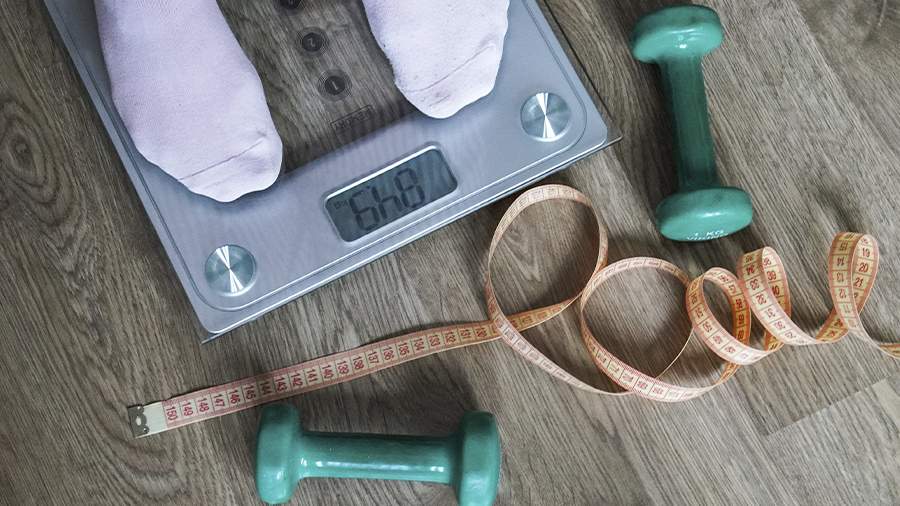The doctor talked about a safe way to lose weight by the summer

With healthy weight loss, a person should lose 0.5–1 kg per week, but if it takes more than 1 kg, this is often due to loss of muscle mass. In addition, it is worth carefully approaching weight loss in the presence of chronic pathologies. On April 23, Daria Pronina, an endocrinologist at the Sberbank Health medical company, told Izvestia what the optimal rate of weight loss is, what foods should be excluded from the diet, and how to avoid food "disruptions."
"Losing weight requires a gradual approach, rather than striving for quick results. During this process, you need to monitor your condition. It is worth noting that in the presence of chronic pathologies, for example, kidney diseases, before starting to lose weight, you should consult with an endocrinologist regarding safe weight loss," the doctor said.
According to her, in order to lose weight, it is necessary to limit the consumption of simple carbohydrates, such as bread made from wheat flour, as well as fatty and fried foods, sugary carbonated drinks and alcohol, since these products are high in calories and low in energy value. In addition, you should reduce the consumption of sweets, as they sharply raise blood sugar levels, after which it also drops sharply, due to which hunger quickly appears.
Instead, the expert explained, it is necessary to consume more protein—containing foods, such as veal, fish, and legumes - they satisfy hunger for a long time and help speed up metabolism. It is also important that vegetables, fruits and berries are present in the diet, because the fiber contained in them helps to improve the functioning of the gastrointestinal tract. At the same time, it is worth including more complex carbohydrates in your diet, for example, cereals and whole-grain bread, as they are slower to digest, saturate for a long time and give the body energy.
"At the same time, it is important to eat a varied and balanced diet. For each meal, a plate 22-23 cm in diameter is mentally divided into four parts: 2/4 should be occupied by vegetables, herbs, fruits / berries; 1/4 vegetable proteins, for example, peas, chickpeas or animals — meat or fish; 1/4 complex carbohydrates, for example, brown rice or pasta," explained the specialist.
She added that a safe and sustainable weight loss is considered to be from 0.5 to 1 kg per week. At the same time, rapid weight loss — more than 1 kg per week — especially when using strict "fat-burning" diets, can lead not so much to a decrease in body fat as to a loss of muscle mass and water in the body. Also, rapid weight loss can trigger a decrease in the level of leptin, a hormone responsible for feeling full, an increase in the level of ghrelin, a hormone that causes hunger and a lack of vitamins and minerals. All these changes can lead to negative health consequences, including deterioration of the skin, hair and nails, a slowdown in metabolism and, as a result, rapid weight gain after the end of the diet.
She advised me to keep a food diary and write down not only the meals I ate, but also to record the degree of hunger on a scale from one to 10 points, where one point indicates severe hunger, and 10 — a feeling of overeating. According to her, it is optimal to eat food with sensations of three to four points and finish it with six to seven points. It is also recommended to eat without being distracted, for example, by browsing social networks, savoring every bite. Pronina explained that this approach minimizes the likelihood of "breakdowns" during weight loss.
In addition, as the doctor explained, it is important to follow the drinking regime — to consume water as thirst arises, on average 1.5–2 liters per day in the absence of contraindications. Fall asleep no later than 23:00, at the same time. It is equally important that sleep lasts at least seven to eight hours, as this contributes to the proper production of the hormone melatonin, which affects the quality of sleep. Proper sleep, in turn, reduces the risk that a person will compensate for lack of energy with food during the day.
"Regular physical activity is also important for weight loss — at least three to four times a week for about 40-50 minutes. This can be, for example, running, swimming or Nordic walking. In addition to keeping motivated during weight loss, it is useful to enlist the support of others, such as friends or family members," concluded the endocrinologist.
Earlier, on April 20, Ekaterina Kashukh, an expert at the Hemotest Laboratory and a gastroenterologist, told Izvestia about the severe consequences of obesity. She explained that obesity increases the risk of gastroesophageal reflux disease, gallstone disease and pancreatitis. This significantly worsens the quality of life. Therefore, it is important to monitor changes in the body and be able to distinguish the norm from pathology.
Переведено сервисом «Яндекс Переводчик»

